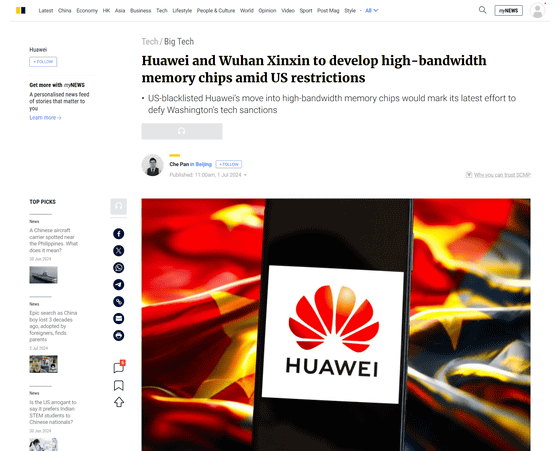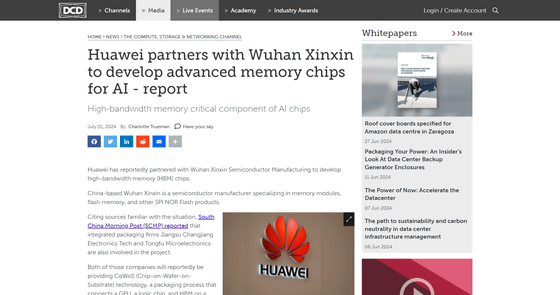Huawei teams up with Chinese foundry Wuhan Xinxin Semiconductor Manufacturing to develop HBM chips, establishing a system to avoid sanctions

by Laboratorio Linux
Huawei, which is under US sanctions, is aiming to become technologically independent by developing high-bandwidth memory (HBM) for AI research and other purposes. It has been revealed that Huawei is collaborating with Wuhan Xinxin Semiconductor Manufacturing Co., Ltd. to develop HBM.
Huawei and Wuhan Xinxin to develop high-bandwidth memory chips amid US restrictions | South China Morning Post
https://www.scmp.com/tech/big-tech/article/3268643/huawei-chip-maker-wuhan-xinxin-develop-high-bandwidth-memory-chips-amid-us-restrictions

Huawei partners with Wuhan Xinxin to develop advanced memory chips for AI - report - DCD
https://www.datacenterdynamics.com/en/news/huawei-partners-with-wuhan-xinxin-to-develop-advanced-memory-chips-for-ai/

The Chinese company Huawei is heavily regulated in the United States, and its announcement of the 5G smartphone 'Mate 60 Pro' equipped with a 7nm process chip in August 2023 has further intensified scrutiny from the US government.
Huawei's latest smartphone 'Mate 60 Pro' is found to be equipped with a 7nm process 5G chip, China has succeeded in avoiding strict US-led export controls - GIGAZINE

The company has been working with Wuhan Xinxiang Semiconductor Manufacturing to develop a DRAM with extremely high bandwidth called 'HBM.' Huawei's aim to produce HBM has been previously reported.
It is clear that Huawei is aiming to produce high-bandwidth memory with government support - GIGAZINE

HBM is characterized by higher bandwidth and lower latency than conventional DDR memory, and is said to be particularly suitable for performing massive calculations in neural network training and inference. For this reason, demand for HBM has increased in recent years due to AI development.
Chinese IC packaging companies Jiangsu Changjiang Electronics Technology and Tongfu Microelectronics are also participating in the development project, and will provide ' chip on wafer on substrate ,' a packaging technology that stacks GPUs and HBMs into a single package.

At the time of writing, China's HBM chip development is in its early stages, but China's technological advances are drawing attention from analysts and industry players around the world amid continuing U.S. restrictions on semiconductor and AI technology. This reflects tensions between the U.S. and China over technological supremacy and signals intensifying international competition in the semiconductor industry.
Related Posts:
in Hardware, Posted by log1i_yk






